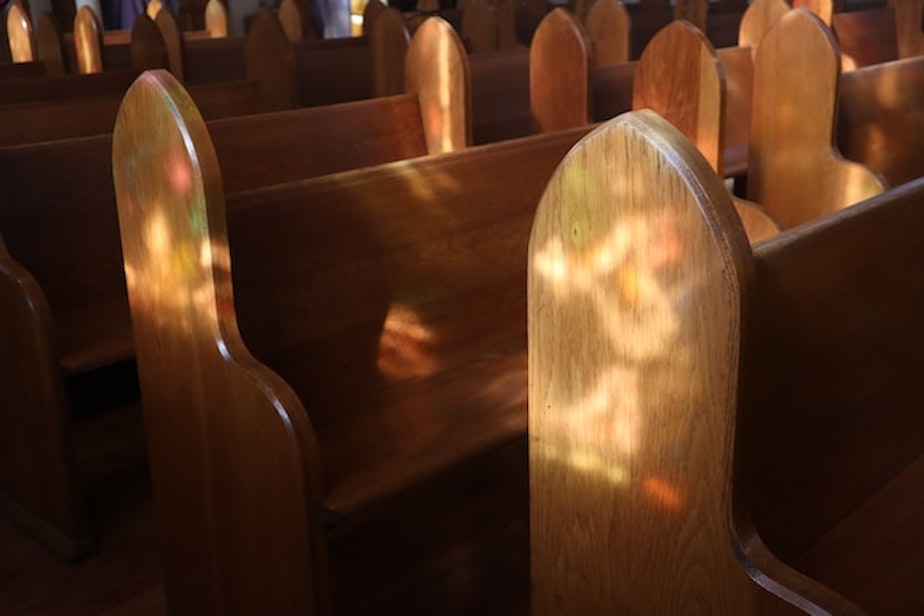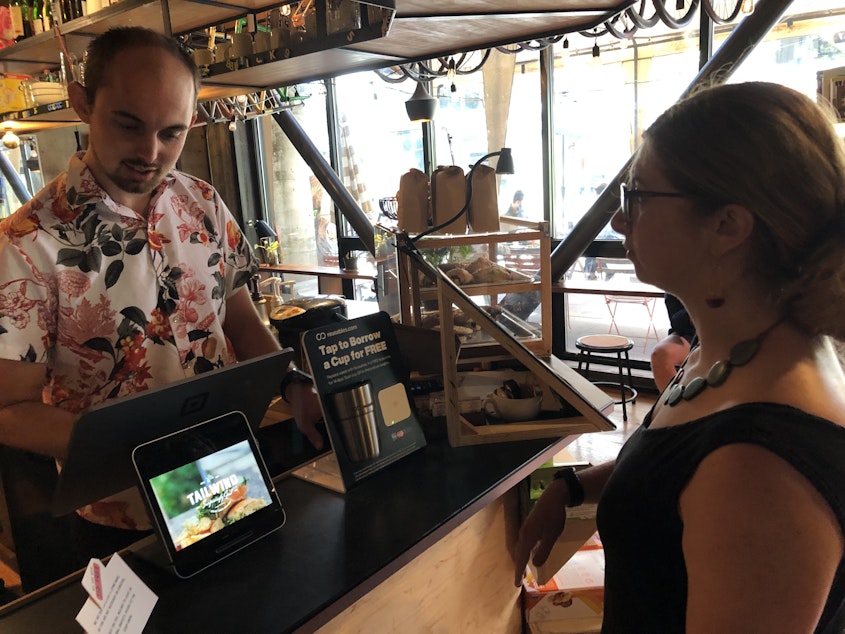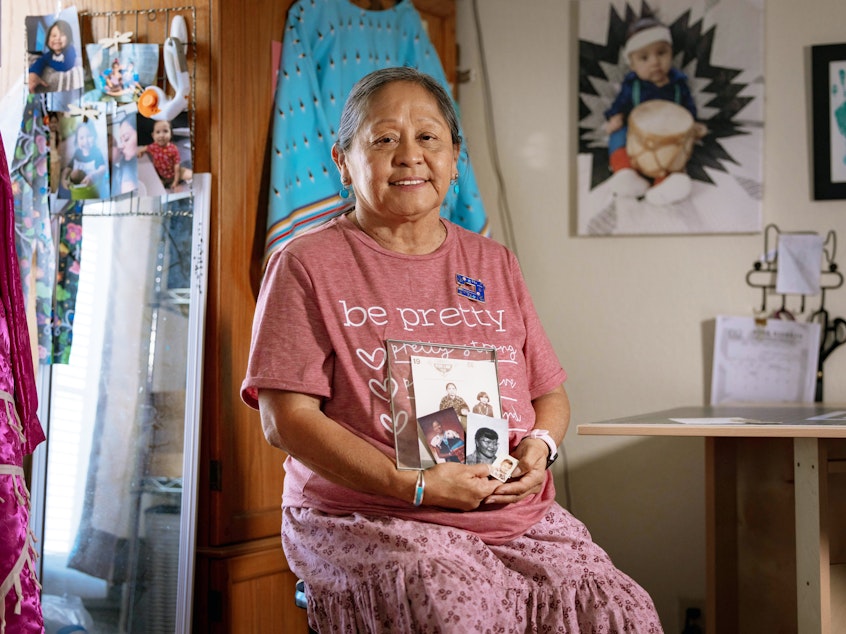How Seattle's churches are evolving: Today So Far

We're becoming less religious, and that poses a problem for our region's churches, especially if they own considerable property.
This post originally appeared in KUOW's Today So Far newsletter for June 6, 2023.
These days, church buildings not only offer Sunday worship, they are a place for 12-step programs, schools, child care, homeless outreach, and a lot more. They often act as community centers. But times are changing. Church members generally bring in money, and that money pays for upkeep and costs for buildings and property. Seattle's churches are finding that they have more space than people to use it, and that creates an insecure financial situation. For some, it's prompting a change in perspective about how churches can serve their communities. This shift was the subject of a recent Soundside segment. It's had me reflecting for a few days. Churches, and what they mean to a community, can be quite different, depending on where you stand.
Growing up, my family had a Sunday morning routine. My mom would pack us all into a car and head to church. We'd sit there in service for what seemed like an entire day. This would be around the ages of 5 or 8, and I would get scolded for swinging my legs, shaking my legs, or playing drums on the music books left in each pew. The silver lining to this whole trip, for young me, was that after each communion time, I would ask to go to the bathroom. I would casually walk in the direction of the restroom, but before getting to the door I would immediately take a hard left and hurry down the stairs to the basement where the church kitchen was. That's where they left all the unused communion crackers on little plates and grape juice in tiny cups, unsupervised. After making sure I was alone, I would quickly scarf down a cracker and chase it with shots of that sweet, divine grape juice like a barfly with a boilermaker. I'd do that until I could hear steps coming down the stairs, and hurry back up to the pews where my leg shaking and drumming received a renewed, sugar-fueled burst for the remainder of the service.
After it was all over, my brother, sister, and I would hurry out to the car and wait for my mom. Whereas my addiction was geared toward shots of grape juice, my mom couldn't get enough socializing. She'd chat while we waited. We once clocked her at around 45 minutes. When we kids would complain about how long she took, she always said the same thing: "You don't understand. This is our family. We are spending time with family." My 8-year-old reply was that any family who forced us to wake up so early on a Sunday morning should be disowned.
More recently, as an adult, I've found myself taking trips to Thai temples throughout Western Washington. It's usually on a special occasion and we take my ma-in-law. Each temple has has a similar vibe. There are resources for Thai-Americans, language classes for kids, and books. Visitors usually bring food and clothing for for the Buddhist monks who live at the temples. There are chants, prayers, and other traditions during service. Sometimes folks bring food from home. In the temple kitchen, it is organized into a feast for everyone to eat together and socialize. During these temple visits, I think my ma-in-law enjoys explaining to me what is happening and why, and commenting on how similar or different it is to her time growing up in Bangkok. Culturally, I have little connection to what is happening, but at the same time, it's all very familiar. Once, during service, I turned to my wife Nina and said, "So, this is basically church then?"
There was a generation gap in my family when it came to church. We moved around a bit, and while I found grape juice, my mom found a community wherever we landed. It was where her friends gathered. For my ma-in-law, a temple is a place where she can connect with a community of others who have experiences like her own. There is something that words can't really touch when it comes to a community, wherever you find it, and how it holds you up as an individual. I may have not caught on to church like my mom did, but I did come away with a certain understanding. What a lot of folks miss is that, beyond religion, churches often serve as community centers, for places to organize for causes. For example, I guarantee that while our region's agencies have tried to catch up with the overwhelming challenge of homelessness, there have been religious organizations tackling it this whole time.
Sponsored
As Soundside notes, religious affiliations have declined in Seattle, Washington state, and the USA for many years now. There are a few numbers around all this, depending on who you ask. They all add up to a similar story.
- Folks in Washington state who claim "none" as their religion on surveys outnumber those who check the boxes for Evangelical, Catholic, or Protestant. As of 2019, about 61% of Washingtonians said they affiliated with a Christian denomination.
- When Gallup began surveying for church membership in the United States back in 1937, about 73% of Americans were members of a church. It stayed that way for decades. But by 2020, only 47% of Americans said they belonged to a church, synagogue, or mosque.
- A total of 66% of adults born before 1946 went to church; 58% of baby boomers; 50% of Gen X, and 36% of millennials.
I'd personally argue that folks have kept the religious fervor, they just place it elsewhere, like Twitter, sports, politics, diets, pop culture obsessions, bronies, the gym, or Elon Musk — places where interests, causes, and community meet. That reminds me, "American Gods" is a great book, if you haven't read it yet. Where was I? Oh yeah ...
Churches are supported by members. For congregations, fewer members means less money coming in, but the bills remain. This dynamic is largely behind the Seattle Archdiocese's current plan to consolidate parishes, an effort it calls "Partners in the Gospel." It's driven by lower attendance and fewer priests. Seattle's churches have also started reacting to this shifting religious landscape in ways unique to their communities.
The faith-based Nehemiah Initiative is addressing issues that have been mounting in Seattle's historically Black neighborhoods. Black churches have property, but congregations have shrunk. Much of that is due to gentrification and members being pushed out of the city, away from the churches. The Initiative aims to help religious organizations update their properties to serve as housing for this community, or places for Black-owned businesses to set up.
Sponsored
"The major source of wealth in our country is through the ownership of homes and Black families have had barriers for decades, if not centuries from being able to own property," Donald King, president and CEO of the Nehemiah Initiative Seattle, told Soundside. "How can this become a new mission for the church in finding ways to provide homeownership opportunities and closing that wealth gap, providing generational wealth for Black families by ownership of their home?"
"Our mission is to disrupt the displacement of the African-American community from urban centers and the retention of what is the historically Black faith-based organizations in central Seattle. And we do that through the development of affordable homes, community spaces, and business places on the underutilized property of those faith-based organizations."
In another corner of Seattle, St. Luke's Episcopal Church has 10 buildings spread across 55,000 square feet of land. The church has decided to tear it all down. It will replace its old buildings with new housing — about 206 apartments — while maintaining a space for its congregation. Two developers will construct the housing, and lease the land from the church, which will retain ownership. It's a risky move that shows that it's not just a financial situation that a church faces. It can also be about how it maintains a community, and serves it.
Those are just two out of a few churches around Seattle that Soundside spoke with about this issue. Check out Soundside's full coverage here.
AS SEEN ON KUOW
Sponsored

DID YOU KNOW
Have you been to a musical lately? High schoolers and their parents certainly have. The Educational Theatre Association has added up all the musicals that took school stages in 2022-23 to find the most popular performances (two are a tie, so it's really like nine), which are:
- The Addams Family
- Mamma Mia!
- Into the Woods
- Little Shop of Horrors
- (tie) Disney’s Beauty and the Beast / Disney’s The Little Mermaid
- The SpongeBob Musical
- Chicago: Teen Edition
- Legally Blonde: The Musical
- Mean Girls: High School Version
Sponsored
ALSO ON OUR MINDS

Federal Indian boarding schools still exist, but what's inside may be surprising
The gym now shines with new equipment and has a wall dedicated to the "Tribes of Riverside." A symbol of the new Riverside, one with a majority Native staff and an emphasis on cultural practices. But for many of the people here, Riverside Indian School was once a waking nightmare.

